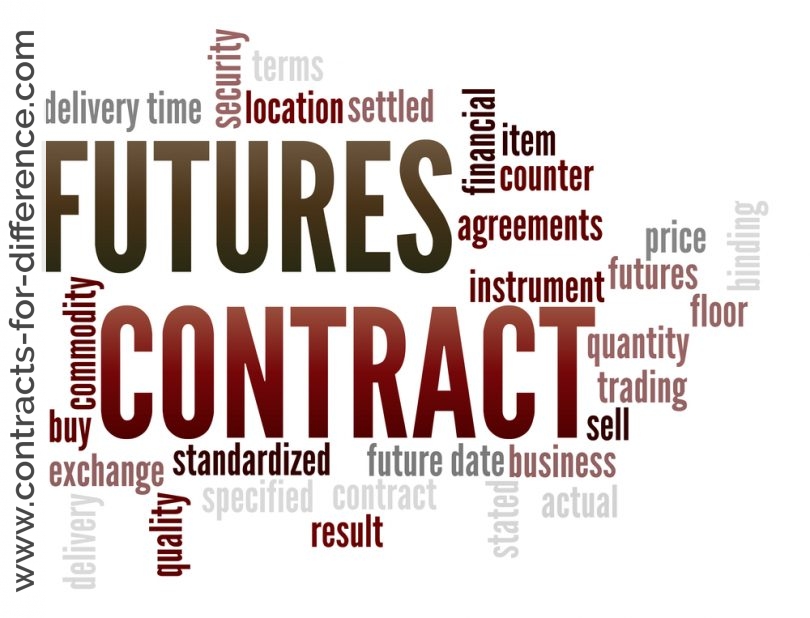CFDs and futures contracts are both highly geared derivative financial products. A financial derivative is so called because its value is based on an underlying asset. In the case of CFDs and futures, the underlying asset is usually a bond, share, commodity..etc Because of the gearing, or leverage, that you can use with them, sometimes people tend to warn you that CFDs and futures are risky. But if you approach trading as a business, you don’t stand aside and let your losses mount up. You get out of a losing position, whatever you are trading in. The advantage of all that gearing is that your profits are multiplied, and that’s something every trader wants.
CFDs and Futures trading are both forms of derivatives trading. A futures contract is an agreement to buy or sell the underlying asset at a set price at a set date in the future, regardless of how the price changes in the meanwhile.
With that said, how can you choose between trading CFDs and trading futures? Well, there are some differences namely expiry dates, financing and liquidity. The futures contracts of today are an offshoot from standardised forward contracts originally developed by the Chicago Produce Exchange. A futures contract is an agreement to buy or sell something at a set price at a set date in the future, regardless of how the price changes meanwhile. Expiry dates have to apply for futures because strictly speaking this represents the date that the asset has to be delivered at the agreed price under the terms of the contract (however in practice this is of little relevance to traders since most futures contracts are settled before the actual expiry date and most of the times the asset doesn’t end up being delivered). Because futures are interchangeable transactions, many traders and speculators who never intend to either make or take delivery of the underlying commodity or instrument can buy and sell futures contracts as a way of making a profit from price fluctuations as market conditions change. They do this by taking an opposite side of an existing open positions before the expiry date – a process known as ‘offsetting’… A contract for difference (CFD) in contrast, has no set future price and no set future date. You just contract to pay or receive the difference between where the underlying goods started, and the price they finish up at when you decide to liquidate the contract.
Now futures contracts are bought and sold on large exchanges yet are still sometimes susceptible to slipped trade executions, whereas CFDs are traded with brokers who are frequently the market makers. Some people argue that this means they manipulate the prices, but with the tremendous popularity of CFDs and competition between brokers, you will find in practice that this should not be a problem Having said that all things being equal futures are the most liquid way to trade commodities and will usually have narrower bid-offer spreads than CFDs. So someone who wants to trade in really big quantitities, futures are probably a better choice.
What can prove to be a problem with futures is the size of contract that you must trade. Futures tend to be traded on the big exchanges and usually will comes with large minimum commitments from market participants as the contracts are designed for use by investment banks and other city institutions.Contract sizes are much larger than for CFDs or spread bets. For instance, while you could readily trade a mere five ounces of gold worth just £7,250 via a CFD, a single Comex gold futures contract is equivalent to 100 ounces, or approximately $145,000 at present prices. In this respect CFDs are much more flexible. Their flexibility also extends to the fact that you can find CFDs in virtually every marketplace, including indices, shares, commodities, currencies, and so on. Instead of having to have many accounts at different brokers if you want to vary your trading, you will find you need one or at most two CFD accounts.
Another advantage of CFDs is that it is much easier to open an account to trade them than to open an account for futures. Generally, there is less regulation surrounding contracts for difference, and you can start trading with much less capital.
There are some other considerations when choosing between CFDs and futures. As mentioned above, they both leverage your money which in practice means that you are charged interest by your broker. However, while with CFDs the interest is charged on a daily basis, with futures the charge is priced into the asset. As stated, the competition for your business should ensure that the rate charged is reasonable, but this is something you need to check. As CFDs are typically a trading vehicle, and you don’t buy them to hold for a long time, the interest is usually not high enough to be a problem. But they do give you the choice to hold them a little longer if you need the price to swing your way, and when you trade futures you may not have the luxury of enough time for this to happen.
Both types of contracts are marked to market, that is re-priced every day, and you can receive interest if you hold a CFD short position. On the whole, CFDs have better flexibility and are preferred by many traders.







